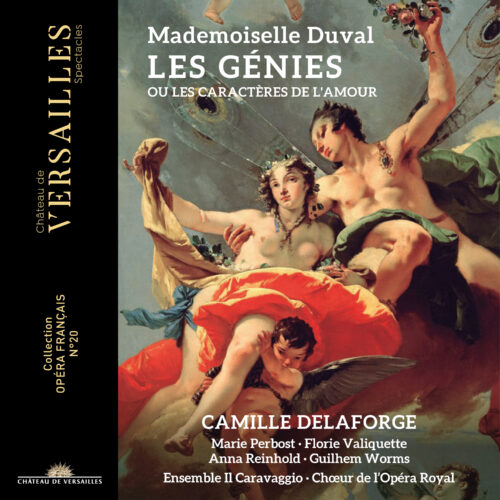We don’t know much about her. In fact, almost nothing (we don’t even know her first name!). Mademoiselle Duval was the daughter of a ballet dancer and an archbishop (yes, past ecclesiastical lifestyle often turned out to be surprising…). Above all, we know that forty years after Élizabeth Jacquet de la Guerre, she was the second woman to have an opera written by her premiered at the Académie royale de musique (in 1732). Much the same thing happened to this opera as to that of her predecessor (Céphale et Procris, which you can read my review of here): it was performed a few times, then forgotten until the present day.
This recording on the Château de Versailles label, which specialises in this kind of resurrection, is therefore a wonderful opportunity to make contact with a rare baroque opera written by a woman.
Although the work was first performed in 1732, at the very beginning of the Ramist musical revolution (initiated by Jean-Philippe Rameau), its stylistic influence has left no trace. Instead, we are in a Lullist world (Jean-Baptiste Lully), already half a century old, or perhaps post-Lullist (André Campra and his conservative style in this first third of the 18th century spring to mind). That said, we certainly won’t deny ourselves the honest pleasure of this lovely discovery, full of endearing melodies, well-drawn arias, energetic instrumental portions and ample, generous choruses. Miss Duval knew what she was doing.
Les Génies (The Spirits) is a comedy-ballet of the sort often performed at the time, including Rameau’s Les Indes galantes. Based on the same principle as Les Indes galantes, Les Génies is divided into five parts, a Prologue and four Acts (known here as Entrées). Each part develops a plot that is different from, but complementary to, the others, with a central theme (love) that serves as a general thread. In Les Génies, we visit the magical worlds of the four natural elements: earth, water, air and fire. In these, spirits associated with these supernatural worlds experience sentimental adventures linked to character traits associated with these elements. You get the idea.
Although the musical style is resolutely conservative for its time, it is nevertheless very skilfully mastered by the composer. Lively, Italianate melodies rub shoulders with delicate arias and vigorous use of the bass strings, lending an interesting muscularity to certain passages.
Quebec’s Florie Valiquette takes on one of the main roles, that of Love, and does a superb job of it. Her soprano is appropriately powerful, but remains luminous and positive. She is surrounded by other soloists in fine form, including Marie Perbost, in several decisive roles magnified by her dramatic determination coupled with an agile timbre, and Étienne de Bénazé, a very handsome tenor who is racy and sunny, without the nasal flare too often associated with the French tenor of the period.
The Il Caravaggio ensemble is conducted with precision and ebullience by Camille Delaforge.
Another fine discovery.
Cast:
Marie Perbost – Lucile, Zaïre, Isménide, Florise
Florie Valiquette – Amour, Zamide, a Sylphide
Anna Reinhold – The Principal Nymph, Pircaride
Etienne de Bénazé – Léandre
Paco Garcia – An Indian, a Sylph
Guilhem Worms – Zoroaster, Numapire
Matthieu Walendzik – Zerbin, Adolphe
Cécile Achille – The African, a Nymph
























